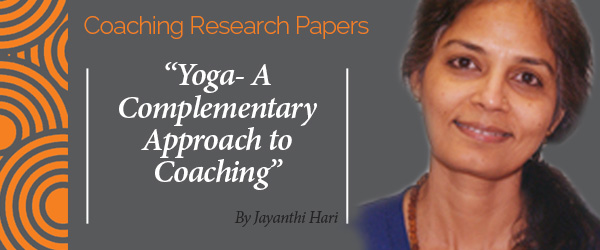Research Paper By Jayanthi Hari
(Life and Business Coaching, CANADA)
Abstract
The individual is an interesting blend of the mind, body and emotion and life energies. From time immemorial, the inter connection between the mind, body and emotion have been understood and studied with a view to achieving the desired state of being for the individual. Coaching helps the individual reach the desired place by shedding light on his thoughts, emotions, beliefs and values and by facilitating awareness through a dialogue with the coach. Yoga, specifically Hata Yoga as a practice, emerged centuries ago to use body postures or Asanas as a tool to create the desired mental state in the individual. Coaching and yoga, when combined, can result in outcomes for the individual that integrate this mind, body and emotional awareness.
The paper sets out the broad objectives for exploring the concept of coaching with yoga, introduces each of these fields, and details the aspects of Hata Yoga that facilitate a desirable life design for the individual. Twelve different concepts that shape and contribute to ‘living a sound and sensible life’ are taken up and illustrated with Asanas and the associated coaching language. The conclusion summarizes how this concept can be used by coaches and clients in promoting self-discovery and movement towards goals.
I INTRODUCTION
The objectives of this paper are multifold:
- To understand the influence of yoga on coaching
- To understand the goals of coaching and yoga and see where they meet
- To examine if yoga can aid the effectiveness of coaching
- To explore yoga as a self development tool to help in the coaching journey
II. ORIGINS AND DEFINITIONS
A. COACHING
Coaching as a field has sprung into popularity in the last 20 years. Coaching emerged and drew from various fields such as management, consulting, philosophy, spirituality and psychology. The ICF defines coaching as:
Professional coaches provide an ongoing partnership designed to help clients produce fulfilling results in their personal and professional lives. Coaches help people improve their performances and enhance the quality of their lives.
(ICA Learn site, ‘What is Coaching’)
Among other things, “the coach by engaging in a dialogue with the client offers:
- (…)
- Support to help the client discover the answers within
- Clarification of values
- Support and challenge to break free of limiting beliefs
- Support in acting on awareness
- Direction” (ICA Learn site, “What is coaching’)
The coach by creating a coaching presence helps the client examine his/her thoughts, feelings and actions in a safe environment so that the client becomes clear about which of these serve his/her goals. Through a process of listening actively to the client and questioning, the coach helps the client develop an awareness of his /her state; this further translates to making choices that empower the client towards goal-oriented action.
B. YOGA
Yoga is an ancient science, which is over 5000 years old. Yoga is derived from the Sanskrit word ‘yuj’ which means ‘union’. A person is in a state of yoga when he experiences everything as oneness in his consciousness.[i] A person is in yoga when his body, mind and energy and the existence are in absolute harmony.[ii] When a person is in complete harmony with everything within and outside, he is operating at the peak of his abilities.
Lord Krishna says:
Fixed in yoga, do thy work, O Winner of wealth (Arjuna), abandoning attachment, with an even mind in success and failure, for evenness of mind is called yoga.
Verse 2.48[19] Bhagavad Gita
Yoga is defined by Patanjali, who is said to have compiled the most famous treatise called the ‘Yoga Sutras’ around 150 CE, comprising 200 aphorisms on the integrated practice of yoga, as the cessation of the various modifications of the mind. In the Yoga Sutras, Patanjali refers to how our perception of situations determines whether we define a situation as difficult or otherwise. Incorrect perception occurs when we understand a situation ‘incorrectly’ and we then proceed to act on the misunderstanding. Likewise, we doubt our understanding of a situation even when it is correct and refuse to act. Both these extremes in perspective arise from ‘avidhya” or ignorance defined as the accumulated result of unconscious ways of reacting that becomes habit forming for the mind.
A further meaning of the word yoga is
to attain what was previously unattainable.
The starting point for this thought is that there is something that today we are unable to do; when we find the means for bringing that desire into action, that step is yoga. […] When we find a way to gain more understanding of others or ourselves through a discussion, we have reached a point where we have never been before. Each of these movements and changes is yoga.[iii]
APPROACHES TO YOGA
Yoga was evolved by the rishis or seekers of the ancient based on a deep understanding of themselves. There are three main approaches to seeking the ultimate potential in the individual. These are Gnana Yoga, Bhakti Yoga, Karma Yoga and Kriya yoga. Gnana Yoga is the use of the intellect to reach the ultimate. In Bhakti Yoga, the person is in complete openness and devotion to the ways of the Universe and receives everything as an act of love. Karma yoga uses physical action as a path to knowing the ultimate. Kriya Yoga is the practice of cultivating one’s life energies in such a way that the body, mind and emotions function naturally and in alignment. In reality, every individual is a unique mix of the various elements of body, mind, emotion and energies; a combined approach is therefore more effective[iv].
